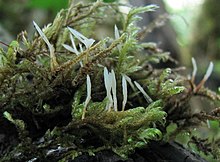Eocronartium muscicola is a species of fungus belonging to the order Platygloeales. It is currently the only species in the monotypic genus Eocronartium.[1][2] In the UK its recommended English name is moss rust.[3] The species forms clavarioid basidiocarps (fruit bodies) on mosses, on which it is parasitic.[4]
| Eocronartium | |
|---|---|

| |
| Eocronartium muscicola Vancouver Island, British Columbia, Canada | |
| Scientific classification | |
| Domain: | Eukaryota |
| Kingdom: | Fungi |
| Division: | Basidiomycota |
| Class: | Pucciniomycetes |
| Order: | Platygloeales |
| Family: | Eocronartiaceae |
| Genus: | Eocronartium G.F. Atk. (1902) |
| Species: | E. muscicola
|
| Binomial name | |
| Eocronartium muscicola (Pers.) Fitzp. (1918)
| |
| Synonyms | |
|
Clavaria muscicola Pers., Observ. mycol. (Lipsiae) 2: 60 (1800) | |
At least 21 moss species, all in the subclass Bryidae, are recorded as hosts for Eocronartium muscicola.[5] The fungus parasitizes its host through its gametophytic transfer cells.[4] The species appears to be widespread, with most reports from Europe, North and South America.[6]
References
edit- ^ Aime MC, Matheny PB, Henk DA, Frieders EM, Nillson RH, Piepenbring M, McLaughlin DJ, Szabo LJ, Begerov D, Sampaio JP, Bauer R, Weiss M, Oberwinkler F, Hibbet DS (2006). "An overview of the higher level classification of Pucciniomycotina based on combined analyses of nuclear large and small subunit rDNA sequences" (PDF). Mycologia. 98 (6): 896–905. doi:10.3852/mycologia.98.6.896. hdl:10362/3249. PMID 17486966.
- ^ Bauer R, Begerow D, Sampaio JP, Weiss M, Oberwinkler F (2006). "The simple-septate basidiomycetes: a synopsis". Mycological Progress. 5 (1): 41–66. Bibcode:2006MycPr...5...41B. doi:10.1007/s11557-006-0502-0.
- ^ Holden L. "English names for fungi - April 2022". British Mycological Society. Retrieved 2023-05-29.
- ^ a b Boehm EW, McLaughlin DJ (1988). "Eocronartium muscicola: a basidiomycetous moss parasite exploiting gametophytic transfer cells". Canadian Journal of Botany. 66 (4): 762–770. doi:10.1139/b88-113.
- ^ Boehm EW, McLaughlin DJ (1989). "Phylogeny and ultrastructure in Eocronartium muscicola: meiosis and basidial development". Mycologia. 81: 98–114. doi:10.1080/00275514.1989.12025630.
- ^ Sandoval P, Henríquez JL, Faúndez L, Larraín JP, Owen RJ (2012). "First records of Eocronartium muscicola (Basidiomycota, Eocronartiaceae) in Chile on two new hosts" (PDF). Gayana - Botanica. 69 (1): 100–104. doi:10.4067/S0717-66432012000100009.